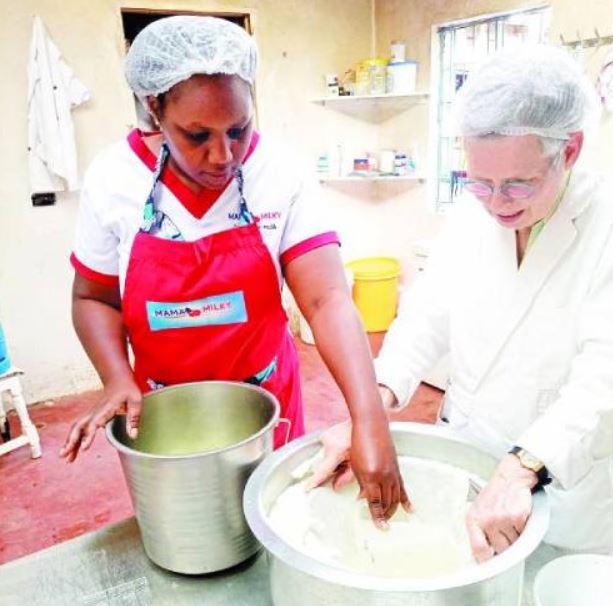
Briefly tell us about your journey in the yoghurt-making business
My name is Njoki Ngugi, or as they call me, Mama Milky. I started my yoghurt-making business in 2015 at Naivasha in a slum called Kararita. At that time, I was employed, so I was doing it as a side hustle.
However, a major challenge was getting pure milk because most brokers who were selling milk used to adulterate it with water. I approached KARO (Kenya Agricultural Research Organisation) in Naivasha, who agreed to provide me with good milk. The business grew slowly, and in 2016, we began adopting a more commercial approach. I decided to leave my employment to devote my full attention to this business because I had seen its potential. Another factor contributing to my decision was the high demand for yoghurt products compared to any of our other products.
Due to space constraints, we moved from Naivasha to Murang’a County for our production operations. Additionally, we established Mama Milk outlets in Naivasha and Nairobi for product distribution.
Tell us about your yoghurt training programme
Our training programme offers two types of sessions: online and one-on-one training. In the one-on-one training, I guide you through all the requirements necessary to successfully launch a yoghurt production and marketing business. We also conduct demonstrations, which include practical training on yoghurt production.
For online training, we usually conduct sessions through WhatsApp, using videos or providing tips. During these sessions, we showcase to trainees the yoghurt production process, along with the necessary requirements for each step.
The charges for online training are more affordable compared to physical training. Specifically, the fee for online training is Sh5,000, whereas for one-on-one training, it is Sh10,000.
We also offer discounts for group training sessions, where the charge is Sh7,000 per person.
What is your motivation behind training people?
The reason why I started to train others is that I personally faced numerous challenges when I began my own venture, and I recognized the need for mentorship and guidance. For instance, I didn’t have a mentor, and I felt that anyone interested in the yoghurt business should have access to knowledge on how to start, what challenges to expect, and how to overcome them. Therefore, for me, training people in yoghurt making is a way of giving back to society.
What were the challenges that you faced while starting up?
One of the challenges I faced was dealing with government regulatory requirements. As a start-up, there were too many regulations to comply with, and it was not easy to be aware of all of them at once. Some of these requirements only came to my attention after I had already started the business, and trying to figure out where to begin and how to handle them became quite overwhelming.
For the trainees I work with, I take the time to go through each regulatory requirement one by one, helping them understand and address them properly.
Another significant challenge I encountered was yoghurt contamination. Unfortunately, I lost a considerable amount of yoghurt due to contamination issues. This experience drove me to emphasize the importance of training people on how to prevent contamination in their yoghurt production processes.
How do you address the challenges?
To address these challenges effectively, we also offer a mentorship programme. I realised while people might receive training in yoghurt making, they often lack ongoing guidance and support when facing obstacles along the way. Our mentorship programme aims to prepare individuals for the challenges they are likely to encounter and helps them effectively navigate through those hurdles.
During the mentorship, we provide comprehensive support to individuals until they are able to establish stability in the market.
Another significant challenge is related to employee theft. After training someone, it is disheartening to witness them lose interest in performing the manual work they were trained for. Moreover, some employees resort to stealing from the business or even absconding with the money. It becomes crucial to find individuals who are not only skilled but also honest and trustworthy.










